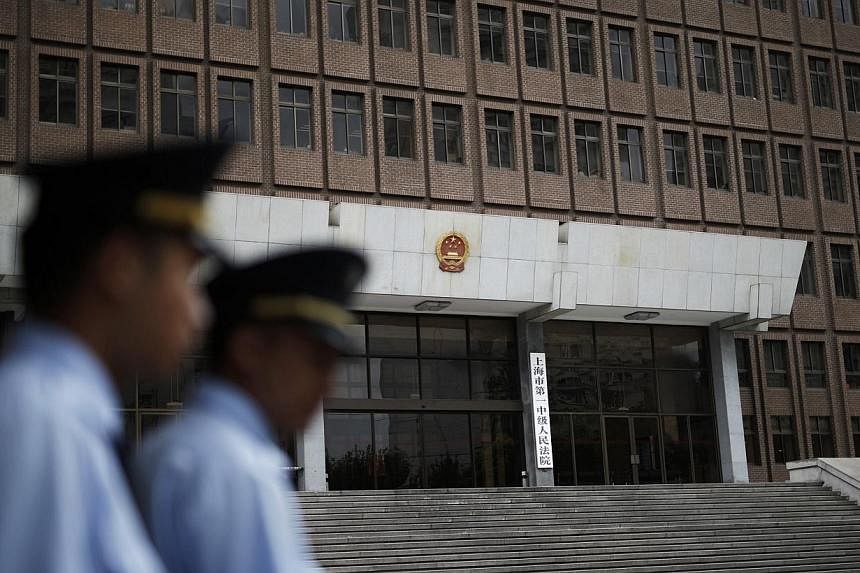The Chinese government is looking into abolishing the death penalty for nine of the 55 crimes that are currently punishable by death, state news agency Xinhua reported on Monday.
According to Xinhua, the nine crimes include counterfeiting currencies, fraudulent fund-raising, arranging for or forcing another person into prostitution, smuggling weapons, ammunition, nuclear materials or counterfeit currencies, obstructing a commander or person on duty from performing his duties, and fabricating rumours to mislead others during wartime.
The Straits Times looks at five high-profile cases in China involving some of these crimes:
Arranging for or forcing another person into prostitution
Wang Ziqi
She lured hundreds of young women to work as prostitutes by disguising her brothels as tea houses, hotels, and beauty salons.
But the law finally caught up with Wang Ziqi, the female head of a gangland prostitution ring in Chongqing in south-west China. She was executed in 2011.
By then, more than 300 women were left victims of her crimes, which ran between 1994 and 2009.
The Daily Mail reported that Wang and her sister Wang Wanning would steal the women's identity cards, ruin their reputations with their families and also took all their earnings. The women were forced to get abortions if they became pregnant, and had to work even when they were menstruating.
Zhou Junhui and Qin Xing
Seven men snatched the 10-year old daughter of Hunan native Tang Hui in 2006, raped her and then forced the young girl into prostitution. Zhou Junhui and Qin Xing were among the men who abused her.
When Mrs Tang found out what happened to her daughter, she made a report and repeatedly pressed her case before the local authorities agreed to launch an investigation.
In 2012, the seven were convicted. Two of them were executed, four received life sentences and one was jailed for 15 years. Zhou and Qin had initially received the death penalty, but the court ruled that the consequences of their actions did not warrant an immediate death penalty. They were among the four who received life sentences.
Mrs Tang found the verdict too lenient and continued to lobby for harsher penalties for those who did not receive the death sentence. Because of her persistent petitioning, she was sentenced to 18 months in a labour camp for disturbing social order. However, this sparked a public outrage and she was released after nine days.
The Telegraph reported last July that Mrs Tang's daughter was taking the Chinese equivalent of the A-levels and her husband was working in another province. Her daughter suffers from genital herpes and post-traumatic stress disorder as a result of what took place when she was 10.
Fraudulent fund-raising
Zeng Chengjie
Real-estate developer Zeng Chengjie was given the death sentence in 2011 after being accused of illegal fund-raising.
Reports alleged that the Hunan native had defrauded more than 57,000 investors out of some 2.8 billion yuan, although he had returned 1.7 billion of that sum.
His case continued to make the headlines after he was executed without his family being notified, and his daughter Zeng Shan took to Weibo, the Chinese Twitter-like microblog, to express her anger about it. Her post went viral and was reposted 72,000 times in two days.
Wu Ying
Wealthy businesswoman Wu Ying, 33, was sentenced to death in 2009 for improperly raising 770 million yuan (S$160 million) from investors between 2005 and 2007.
Following an outcry over the severity of her sentence, her death sentence was commuted to life imprisonment in July.
Once listed as the sixth-richest woman in China, the Wenzhou-born Wu began as a hairdresser, but started raking in money via underground loans. She reportedly also cheated investors of about 380 million yuan by offering returns as high as 180 per cent.
At the height of her activities, she was said to have invested in over 700 shops with beauty parlours, spas, hotels and property in her name, as well as some 20 cars, including four BMWs and a Ferrari.
Counterfeiting currencies
Wu Shengyou
Wu Shengyou was sentenced to death in 2012 for producing millions worth of fake yuan, together with a group of accomplices.
He reportedly produced 195 million yuan of counterfeit banknotes in 100 yuan denominations in Hunan between 2009 and 2010, and transported them to Guangzhou. Wu, the ringleader, and his group members managed to sell some 128 million yuan of the fake notes, before they were found out by the police.
They sold each fake 100-yuan note for about 3-3.5 yuan.
Wu's seven other accomplices received penalties ranging from life imprisonment to a five-year jail term, reported China Daily.
Sources: Xinhua, New York Times, Reuters, International Business Times, Telegraph, South China Morning Post, Time, China Daily, Associated Press, Daily Mail


